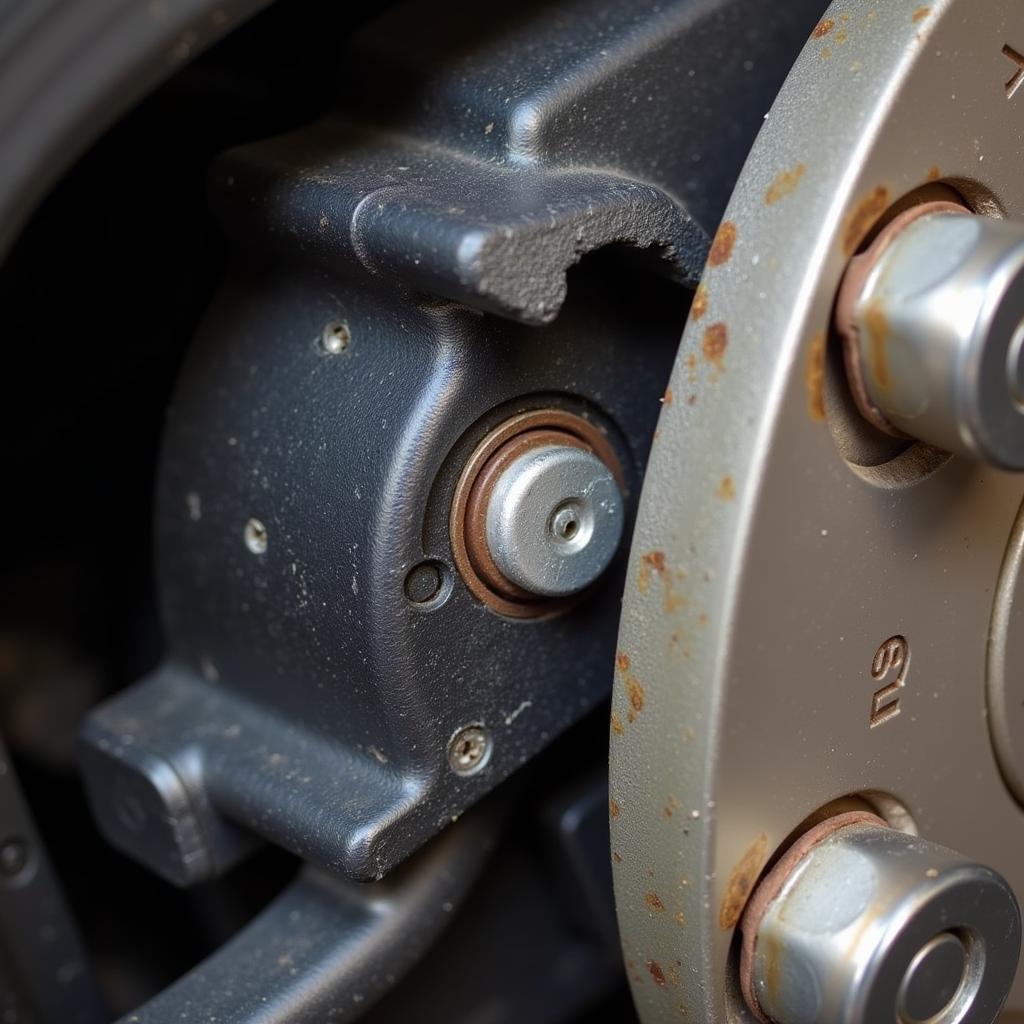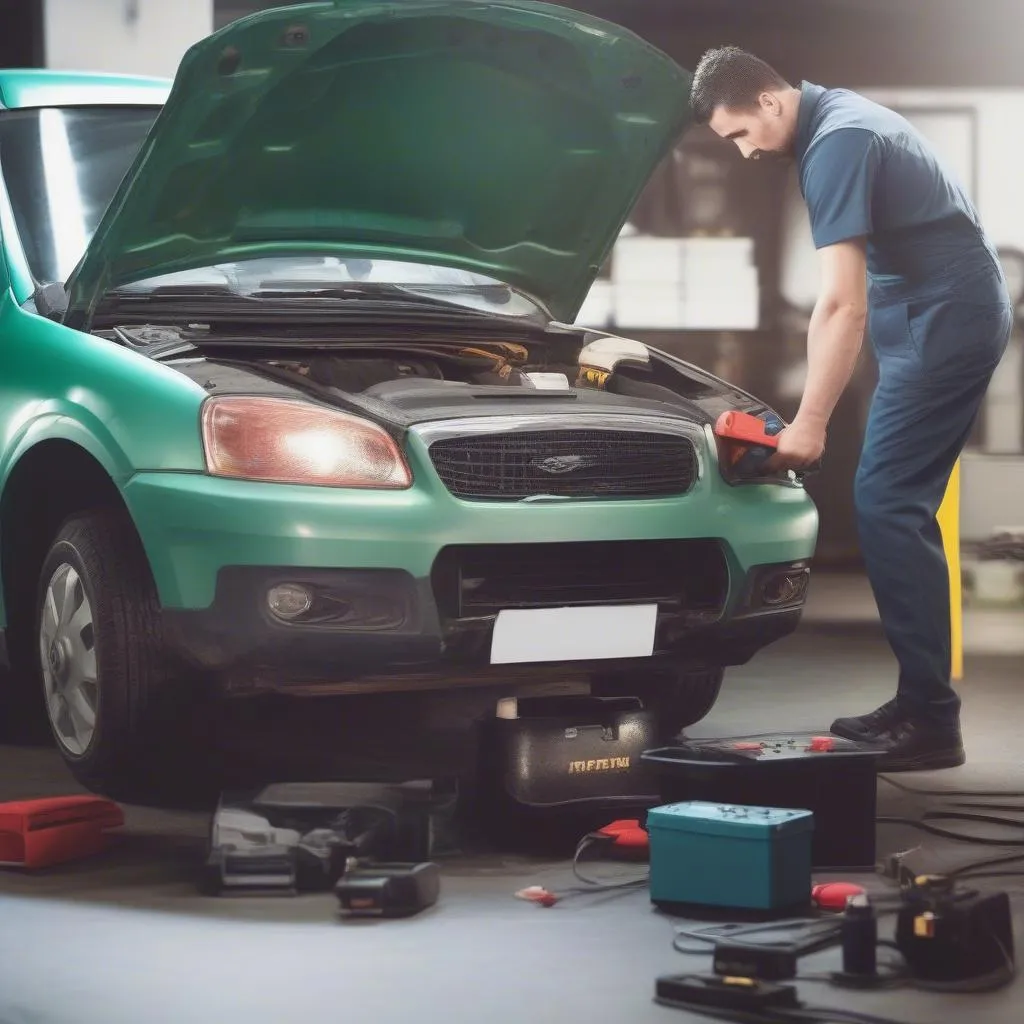Warner brake discs are a vital component of many modern vehicles, playing a crucial role in ensuring safe and efficient braking. However, like any other automotive part, they can encounter issues over time, impacting your vehicle’s braking performance. As an expert in automotive electrical engineering specializing in remote diagnostics, programming, and software installation, I’m here to guide you through common Warner brake disc problems and how to address them.
Understanding Warner Brake Disc Systems
Before we delve into specific issues, let’s briefly understand how Warner brake disc systems work. Warner is a renowned manufacturer of electronic braking systems used in various vehicles, including trucks, buses, and trailers. These systems often incorporate an electric brake controller, Warner electric brake module, and Warner brake controller, working in tandem to provide reliable braking power.
The brake disc itself is a metal rotor that rotates with the vehicle’s wheels. When you apply the brakes, the brake pads, housed within the caliper, clamp down on the disc, creating friction that slows down and stops the wheel’s rotation. In a Warner system, this entire process is electronically controlled, ensuring precise and efficient braking force distribution.
Common Warner Brake Disc Problems and Solutions
Several issues can arise with Warner brake discs, often signaled by specific symptoms. Recognizing these signs early on can help prevent further damage and costly repairs. Here are some common problems and their potential solutions:
1. Squealing or Screeching Brakes
Problem: One of the most common and often alarming signs is a high-pitched squealing or screeching sound when applying the brakes.
Causes:
- Worn Brake Pads: This is the most likely culprit. As brake pads wear down, a wear indicator designed to produce noise may be contacting the disc, signaling it’s time for replacement.
- Glazed Brake Pads: Excessive heat can cause the brake pad material to harden and become glazed, resulting in a reduced friction surface and squealing noises.
- Dirty Brake Discs: Dirt, debris, or rust on the brake disc surface can interfere with pad contact and cause noise.
Solutions:
- Inspect Brake Pads: If the pads are worn below the recommended thickness, replace them immediately.
- Deglaze Brake Pads: Lightly sanding the brake pads with sandpaper designed for automotive applications can remove the glazed layer and restore some friction. Consult your vehicle’s service manual or seek professional help for this procedure.
- Clean Brake Discs: Thoroughly clean the brake discs with a brake cleaner or isopropyl alcohol to remove any contaminants.
2. Grinding Noise When Braking
Problem: A harsher grinding sound when braking often indicates a more serious issue that requires immediate attention.
Causes:
- Severely Worn Brake Pads: When brake pads are completely worn down, the metal backing plate of the pad directly contacts the brake disc, causing a loud grinding noise and potentially damaging the disc.
- Worn or Damaged Brake Disc: Excessive wear, deep grooves, or warping on the brake disc can also cause grinding as the pads struggle to make proper contact.
Solutions:
- Immediate Brake Pad Replacement: If you suspect your brake pads are completely worn, do not drive the vehicle until you’ve replaced them. Continuing to drive with metal-on-metal contact will further damage the brake disc.
- Brake Disc Inspection and Resurfacing/Replacement: Depending on the severity of the damage, the brake disc might need resurfacing or replacement. Consult a qualified mechanic to assess the disc’s condition.
3. Vibrations or Pulsating Brake Pedal
Problem: Experiencing vibrations or a pulsating sensation in the brake pedal, particularly when braking at higher speeds, suggests a possible issue with the brake disc’s evenness.
Causes:
- Warped Brake Discs: Excessive heat can cause the brake discs to warp or become uneven, leading to vibrations when braking.
Solutions:
- Brake Disc Resurfacing or Replacement: A mechanic can measure the disc’s thickness and runout (the amount of wobble) to determine if it can be resurfaced to restore its evenness. If the warping is too severe or the disc is below the minimum thickness, replacement is necessary.
4. Brake Warning Light Illumination
Problem: Modern vehicles equipped with Warner brake systems often have a dedicated brake warning light on the dashboard. If this light illuminates, it signals a potential issue with the braking system, including problems with the electronic components.
Causes:
- Low Brake Fluid: The brake warning light can be triggered by low brake fluid levels, indicating a leak in the system or excessively worn brake pads.
- Faulty Brake Sensor: Warner brake systems use sensors to monitor various aspects of the braking system. A malfunctioning sensor can trigger the warning light.
- Issues with Electronic Components: Problems with the electronic brake controller, china yj.6fy warner electric brake clutch, or other related modules can also illuminate the warning light.
Solutions:
- Check Brake Fluid Level: Inspect the brake fluid reservoir and top it off if necessary. If the fluid level is consistently low, have the system checked for leaks.
- Diagnose Sensor and Electronic Issues: Connect a diagnostic scanner to the vehicle’s OBD-II port to read fault codes related to the braking system. This can help pinpoint sensor failures or electronic component malfunctions. Seek professional help if you’re not comfortable working with diagnostic tools.
Importance of Timely Inspection and Maintenance
Regular inspection and maintenance of your Warner brake disc system can go a long way in preventing costly repairs and ensuring optimal braking performance.
Here are some preventative measures:
- Adhere to Brake Pad Replacement Intervals: Consult your vehicle’s owner’s manual for recommended brake pad replacement intervals.
- Inspect Brake Fluid Regularly: Check the brake fluid level at least once a month and top it off if necessary.
- Have Your Brakes Inspected Annually: Schedule a comprehensive brake system inspection by a qualified mechanic at least once a year or more frequently if you drive in demanding conditions.
Conclusion
Maintaining a properly functioning brake system is paramount for your safety and the safety of others on the road. Recognizing the signs of potential Warner brake disc problems and addressing them promptly can help prevent more serious issues and costly repairs.
By understanding the common problems, possible causes, and solutions outlined above, you can take proactive steps to ensure your Warner brake disc system remains in optimal condition. Remember, if you’re ever unsure about any aspect of your vehicle’s braking system, seek professional assistance from a qualified mechanic or authorized service center. Your safety is always worth the investment.


